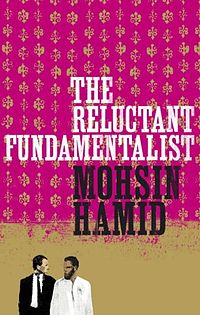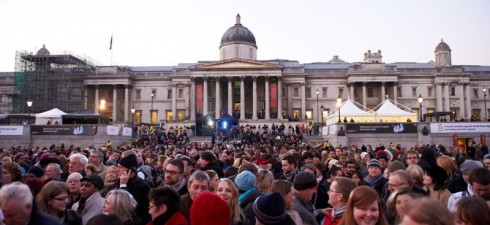Welcome to a new segment on Stacks where I give brief reports on what I’ve been reading or listening to lately. Today’s edition will feature four novels I’ve read in the last month, including one that was on my to do list for this year. Please join me and share what you’ve been reading lately in the comments (or, you know, thoughts on any of the books I’ve mentioned)!
The Reluctant Fundamentalist by Mohsin Hamid
 Hamid’s taut, elegant novel, published in 2007, takes place during the course of an evening in an open-air Lahore restaurant, where a Pakistani man called Changez tells a mysterious, possibly dangerous, American stranger about his love affair with, and eventual disillusionment and abandonment of, America.
Hamid’s taut, elegant novel, published in 2007, takes place during the course of an evening in an open-air Lahore restaurant, where a Pakistani man called Changez tells a mysterious, possibly dangerous, American stranger about his love affair with, and eventual disillusionment and abandonment of, America.
Hamid avoids the expected religious discussions associated with fundamentalism and instead takes aim at the American Dream. Like the American woman whom Changez becomes infatuated with, America is painted as magnetic and enormously compelling. Indeed, Erica, the beautiful and dangerously nostalgic object of Changez’s desire, is an extended metaphor for the narrator’s adopted country, as is Underwood Samson, the elite and high-powered business Changez comes to work for. However, Changez is hinting at his future with America and Erica when he observes, “for the first time I perceived that there was something broken behind them, like a tiny crack in a diamond that becomes visible only when viewed through a magnifying lens; normally it is hidden by the brilliance of the stone.”
The Reluctant Fundamentalist ultimately works because of Hamid’s restraint. Despite the confessional, alternately friendly and menacing, tone of Changez’s account to the stranger, the reader is left to wonder about the reliability of the narrator, the true nature of his motivations and the identity of the American stranger.
* Note: I was given this novel by a friend as part of UK World Book Night — a celebration of great writing and the pleasures of reading. For this year’s celebration, 25 novels were selected and 40,000 copies of each title were given away. The books were not printed to be sold, but to be given and shared. I will send the book along to the first D&S reader who would like the book. If you are interested, let me know in the comments and I will get in touch with you.
One Day by David Nicholls
Nicholls’ 2009 novel follows the course of an unlikely friendship and love affair between two characters who first meet on the night of their graduation from university. Each chapter follows the characters, Emma and Dexter, on 15 July, St. Swithin’s Day, for twenty years. Nicholls writes with humor and compassion, but he is a sharp-eyed observer who delights in exploring the insecurities and foibles of his characters (perspiration abounds in the descriptions) and modern life. In some ways, imagine an extended riff on the famous balcony scene from Annie Hall.
However, despite the veneer of wit and lightness, One Day, like Annie Hall, thoroughly explores the yearning and longing for connection that all human beings experience, giving the novel an unexpected weight and unpretentious profundity. For more fun and games, read with your partner or in a book club with mixed genders.
Room by Emma Donoghue
Room made my list of must-reads from last year. The story is told from the perspective of a five-year-boy, Jack, who is being held captive in a small room along with his mother. Donoghue reportedly conceived the story after hearing about five-year-old Felix in the Fritzl case. Despite the gruesome-sounding premise, Room never feels exploitative or melodramatic and is instead a tender novel about survival and the love between a mother and her child. Much of the novel reads like a thriller and Jack makes a lovely and haunting protagonist that will stay with you for days.
Cutting for Stone by Abraham Verghese
Currently an NPR book club selection, the 2009 novel is a colorful, sweeping saga set in Verghese’s native Ethiopia from the 1940s to the present. It is the story of twin brothers, orphaned by their mother, an Indian nun, and abandoned by their father, a white British doctor. Verghese is at his best when painting a picture of the country and the larger than life characters that join together to raise the twins, which he does with vivid detail and imagination. However, I was left somewhat disappointed by the ending of the book, which took on the (not entirely unpleasant) feeling of a medical soap opera. Still, worth a read.

I don’t have your e-mail address, Heidi, but I would really love that copy of The Reluctant Fundamentalist, if no one else has snapped it up already.
Victoria, it’s yours! I’ll send you an e-mail.
And, please, come back to D&S and tell us what you thought of the book.
I read *Reluctant Fundamentalist* (how do you put italics in a comment?) a couple years ago, but I didn’t like it much. I had a hard time following it and didn’t end up caring much about the characters. I was disappointed.
I haven’t read the others.
Interesting Heather. Some books work their magic on me after I read them instead of while I read them (although my favorites do both). I finished The Reluctant Fundamentalist feeling vaguely dissatisfied, but then found myself thinking about it a lot and feeling it was better and more thought provoking then it seemed at first read.
Wanna share what you are reading? :)
Sure! In the last month or so, I’ve read:
1) *The Piano Teacher* by Janice Y. K. Lee – I didn’t love this, but was intrigued enough by the setting (Hong Kong, when WWII first broke out) that I finished it.
2) *Beauty Junkies: Inside Our $15 Billion Obsession With Cosmetic Surgery* by Alex Kuczynski – I’m writing a post on this one. Wow. Just “wow” for now.
3) *Between a Rock and a Hard Place* by Aron Ralston – another “wow.” This is the book about the guy who got his arm pinned underneath a rock while hiking in Utah and ended up amputating his own arm. After seeing the movie (127 Hours), I went right to the library and checked out the book. Both were amazing.
4) *The Worst Hard Time* – about the dust bowl. I really learned a lot from reading this book, so I’d recommend it to anyone interested in history.
Thanks for the reports. (I love the word “taut”, btw.) “Room” looks especially wonderful!
Taut is a great word. :)
I read a review once of J.K. Rowling that called her prose “sturdy” and said her genius was to be found in her pacing. I liked that and think it applies well to Donoghue’s writing. Great pacing is no small feat, nor is writing in the voice of a child (or for children, in Rowling’s case). For example, Safran Foer’s Extremely Loud and Incredibly Close is beautifully written and more artistically satisfying (and a book that I really liked), but I felt that Oskar’s voice was not always consistent with a nine-year-old.